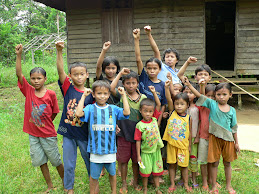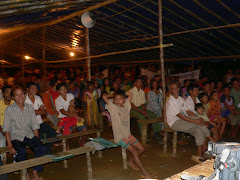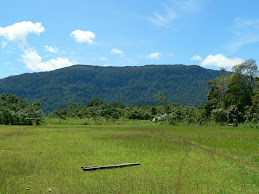Munying, a Dayak traditional healer
The
Munying is not much different from everybody else in his village. Living in a four meter-by-five meter wooden house in Tanjung village, Jalai Hulu district, he makes a living as a farmer.
But he is also known as a healer, or baliatn. Since childhood he has never been much interested in religion. ""I can't comprehend religion,"" he says.
""Once I had an illness that was hard to cure and I almost went mad,"" he recalls.
He suffered for a long time, but Hangiq, a baliatn from Air Dua, healed him. Since then, he has studied the arts of the healer so he too can help others.
As a baliatn, Munying leads a different life than people of other Dayak subtribes. He must, for example, be able to fast for seven days. There is also a period in which he can eat only certain foods. And he must be able to stir-fry seven grains until each forms something like a cracker.
A baliatn can eat only three grains, and must dump the rest on the ground. In a barayah rite (Dayak Jalai-Ketapang), refraining from eating certain foods and fasting are compulsory. Without this process, one cannot be a legitimate baliatn.
Payment for the services of a baliatn are large earthen jugs, plates, bowls and so forth, suitable to the disease cured. If someone is cured of an illness, then he must give the baliatn six plates, a machete and a chicken, plus some rice. Sometimes, the healer will not take this gift. So, a healer is in essence a volunteer worker, and cannot be blamed if his healing powers fail him.
Munying says he does not regret becoming a healer, because it was his destiny. To be a healer, a person must suffer. Understandably, only a few people are able to qualify.
Healers from Dayak Ketungau Sesat also have their own superstitions. They must not walk through a cemetery. They may not divulge their supernatural partner. And after healing someone, they can't go home alone.
Then the healers -- also called manang -- must not eat certain foods. They also are not allowed to refuse a request to heal someone.
""Even if there are hurricanes or rainstorms, I must go to a patient's house even though I have to walk,"" Munying said.
To be a healer is to assume a heavy social responsibility indeed. There is little economic gain. Almost all Dayak tribes allow a healer to receive their fees only in the form of goods. A healer cannot set his fees. The sick person gives something to his healer voluntarily. If he can afford to give a healer only some plates, the healer must accept this gift.
It is a social profession, as such a Dayak healer lives a modest life. As being a healer entails heavy consequences, not many Dayak youngsters are interested in this profession.
--Erma S. Ranik





Tidak ada komentar:
Posting Komentar